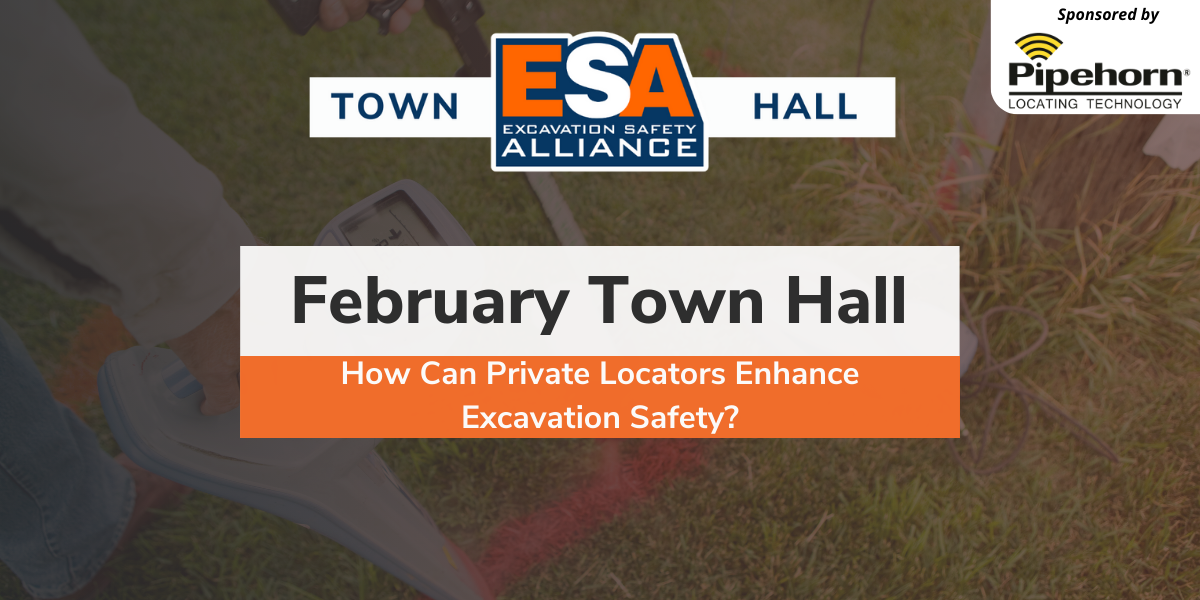
Thank you to Pipehorn Locating Technology for sponsoring this Town Hall.
In our recent Town Hall, we focused on the impact of private locators. With unmarked utilities posing risks and causing delays, private locators play a pivotal role. In this Town Hall, we dove into into real-world challenges, practical solutions, and the measurable contributions that private locating companies make to enhance excavation safety.
Our participants for this Town Hall included:
Moderator: Scott Landes, CEO, Excavation Safety Alliance
Panelists:
- Kevin A. Hintz, Utility & Railroad Coordination Department Head, Butler, Fairman & Seufert, Inc.
- Jake Mason, President, Mason Private Locating
- Chris Sears, Project Coordinator, Poindexter Excavating, Inc.
The discussion began by differentiating between public and private utilities. While public utilities, like gas and electric lines feeding homes, fall under the purview of utility companies, private utilities encompass any infrastructure owned by private entities, like parking lot lights at a grocery store or gas station fuel lines. This distinction holds substantial safety implications, as locating and handling these infrastructure types require distinct approaches.
One surprising revelation from the panel was the estimated 65% share of buried cables and pipelines under private ownership. This statistic underscores the critical need for employing private locators, even after contacting 811. Cautionary tales were shared, including a near-miss with high-voltage cables, emphasizing the inherent dangers and financial risks associated with unlocated private utilities.
Our moderator, Scott, also had our panelists address the following questions:
- How does a private locating company interact with public locating companies or their local 811’s? Should they?
- What type of projects typically require private locating? Who uses it?
- Is cross-bore mitigation a service that private locating companies offer?
- Where do SUE field services fit into private utility locating?
Our audience was also quite active with question of their own, including:
- How accurate is the 811 information provided to contractors/private utility locators?
- How can notification centers do a better job of educating the digging public? Often, awareness activity focuses 100% on contacting the notification center and doesn't do enough to educate about the danger in not getting additional private locates.
- Are other utility companies helpful with providing information to help you (the private locators) complete the private locate or not so much?
- Will 811 in any state contact a private locator as they do with all the local utility operators?
- Does any jurisdiction have GIS mapping data accessible for all public utilities?
- Will a private locator attempt to locate public utilities?
Curious to see what else was discussed in the chat? View the Chat Log.
Here is a brief recap of our participants takeaways:
Kevin Hintz:
It all boils down to risk management. Private locates offer less risk than relying solely on public ones. Having accurate information before design commencement is paramount for us. Designing around known utilities not only ensures safety during excavation but also minimizes risks and costs.
Chris Sears:
The key takeaway here is centralized communication and utilizing private locates. While it may seem costly upfront, it's a crucial investment that not only saves lives but also shields the company from hefty fines. Effective communication and collaboration are paramount. Contractors often face frustration when markings are incomplete or missed, emphasizing the importance of a unified approach.
Jake Mason:
Education remains a critical aspect, with significant room for improvement. Equipping teams with knowledge about the importance of private locates and when to utilize them could greatly mitigate daily risks. Enhancing communication between 811 systems and private locating companies is essential for aligning efforts towards a common goal of damage prevention. By integrating both sides seamlessly, we can ensure a comprehensive damage prevention program that prioritizes safety and propels our nation forward.
Want to hear everything that was discussed by our panelists? View the full Town Hall.
Mark your calendars for our next Town Hall on March 19th and pack your bags as the 2nd annual ESA Town Hall LIVE will be taking place at the Global Excavation Safety Conference in New Orleans.
Comments